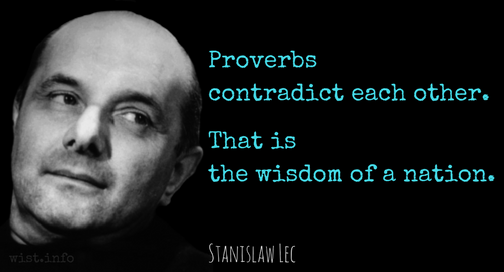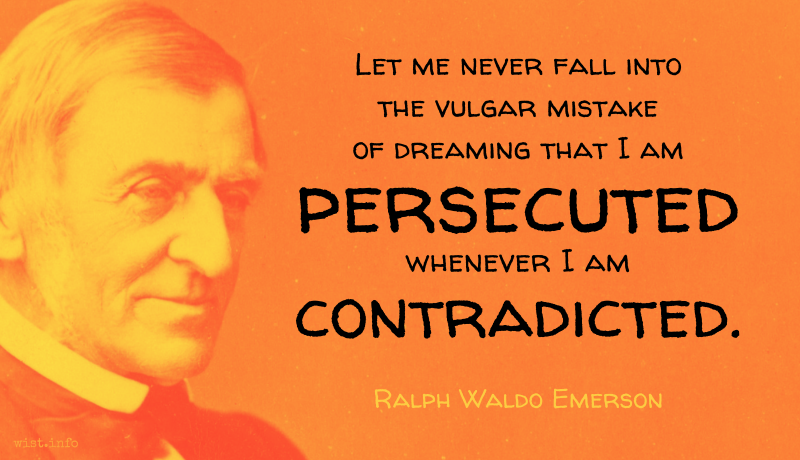You can see how infinitely laborious and fruitless it would be to try to refute every objection they offer, when they have resolved never to think before they speak provided that somehow or other they contradict our arguments.
[Quorum dicta contraria si totiens uelimus refellere, quotiens obnixa fronte statuerint non cogitare quid dicant, dum quocumque modo nostris disputationibus contradicant, quam sit infinitum et aerumnosum et infructuosum uides.]
Augustine of Hippo (354-430) Christian church father, philosopher, saint [b. Aurelius Augustinus]
City of God [De Civitate Dei], Book 2, ch. 1 (2.1) (AD 412-416) [tr. Bettenson (1972)]
(Source)
(Source (Latin)). Alternate translations:
If we should bind ourselves to give an answer to every contradiction that their impudence will thrust forth (how falsely they care not, for they do but make a show of opposition into our assertions), you see what a trouble it would be, how endless, and how fruitless.
[tr. Healey (1610)]
Now, if we were to propose to confute their objections as often as they with brazen face chose to disregard our arguments, and so often as they could by any means contradict our statements, you see how endless, and fruitless, and painful a task we should be undertaking.
[tr. Dods (1871)]
You can easily see what an endless, wearisome, and fruitless task it would be, if I were to refute all the unconsidered objections of people who pig-headedly contradict everything I say.
[tr. Zema/Walsh (1950)]
If we were bound to refute their objections every time they make their bull-headed resolve not to consider the meaning of their words as long as they deny our arguments, no matter how, you see how endless and wearisome and unprofitable it would be.
[tr. McCracken (Loeb) (1957)]
If we resolved to refute their contrary arguments as often as they resolve obstinately to contradict our reasoning in whatever way they can, without considering the truth of what they say, you see what an infinite and toilsome and fruitless task we should have.
[tr. Dyson (1998)]
So you see how endlessly futile and fruitless it would be if we wanted to refute their objections every time they obstinately resolved not to think through what they say but merely to speak, just so long as they contradict our arguments in any way they can.
[tr. Babcock (2012)]
Quotations about:
contradiction
Note not all quotations have been tagged, so Search may find additional quotes on this topic.
The supposed wisdom of proverbs is mainly imaginary. As a rule, proverbs go in pairs which say opposite things. The opposite of “More haste, less speed” is “A stitch in time saves nine.” The opposite of “Take care of the pence and the pounds will take care of themselves,” “Penny wise, pound foolish.” The opposite of “Two heads are better than one,” is “Too many cooks spoil the broth.” And so on. The great advantage of a proverb in argument is that it is supposed to be incontrovertible, as embodying the quintessential sagacity of our ancestors. But when once you have realised that proverbs go in pairs which say opposite things you can never again be downed by a proverb; you merely quote the opposite.
Bertrand Russell (1872-1970) English mathematician and philosopher
“On Proverbs,” New York American (1932-11-16)
(Source)
A polite man is one who listens with interest to things he knows all about, when they are told him by a person who knows nothing about them.
Charles de Morny (1811-1865) French statesman [Charles Auguste Louis Joseph de Morny, 1st Duc de Morny]
(Attributed)
Earliest reference found here (1872).
It was one of the rules which above all others made Doctr. Franklin the most amiable of men in society, “never to contradict any body.” if he was urged to announce an opinion, he did it rather by asking questions, as if for information, or by suggesting doubts.
Thomas Jefferson (1743-1826) American political philosopher, polymath, statesman, US President (1801-09)
Letter to Thomas Jefferson Randolph (24 Nov 1808)
(Source)
Referring to Benjamin Franklin.
Even when it comes to learning, the good student contradicts his teacher and makes him more eager to explain and defend the truth. Challenge someone discreetly and his teaching will be more perfect.
[Y aun para el aprender es treta del discípulo contradecir al maestro, que se empeña con más conato en la declaración y fundamento de la verdad; de suerte que la impugnación moderada da ocasión a la enseñanza cumplida.]
Baltasar Gracián y Morales (1601-1658) Spanish Jesuit priest, writer, philosopher
The Art of Worldly Wisdom [Oráculo Manual y Arte de Prudencia], § 213 (1647) [tr. Maurer (1992)]
(Source)
(Source (Spanish)). Alternate translations:
In matter of learning it is a cunning fetch in the Schollar to contradict his Master, inasmuch as it lays an obligation upon him, to labour to explain the truth with greater perspicuity and solidity.) So that moderate contradiction gives him that teaches occasion to teach thoroughly.
[Flesher ed. (1685)]
Also in learning it is a subtle plan of the pupil to contradict the master, who thereupon takes pains to explain the truth more thoroughly and with more force, so that a moderate contradiction produces complete instruction.
[tr. Jacobs (1892)]
A good trick on the party of the pupil is to bait his teacher, who thereby excites himself to greater effort in the declaration, and the foundations of this beliefs, whence it comes that well-moderated debate makes for most effective teaching.
[tr. Fischer (1937)]
The vulgar ignorance of stubborn people makes them prefer contention to truth and utility. Prudent people are on the side of reason, not passion, whether because they foresaw it from the first, or because they improved their position later.
[Vulgaridad de temáticos, no reparar en la verdad, por contradecir, ni en la utilidad, por litigar. El atento siempre está de parte de la razón, no de la pasión, o anticipándose antes o mejorándose después.]
Baltasar Gracián y Morales (1601-1658) Spanish Jesuit priest, writer, philosopher
The Art of Worldly Wisdom [Oráculo Manual y Arte de Prudencia], § 142 (1647) [tr. Maurer (1992)]
(Source)
(Source (Spanish)). Alternate translations:
It is the custome of the head strong to regard neither truth in contradicting; nor profit in disputing. A wise man hath always reason on his side, and never falls into passion. He either prevents or retreats.
[Flesher ed. (1685)]
'Tis the common failing of the obstinate that they lose the true by contradicting it, and the useful by quarrelling with it. The sage never places himself on the side of passion but espouses the cause of right, either discovering it first or improving it later.
[tr. Jacobs (1892)]
The vulgarity of these clowns, that they observe not the truth, because they lie, nor yet their own interest, because on the wrong side. A heedful man stands always on the side of reason, and never that of passion, either because he foresaw it from the first, or found it better afterwards.
[tr. Fischer (1937)]
Proverbs contradict each other. That is the wisdom of a nation.
Stanislaw Lec (1909-1966) Polish aphorist, poet, satirist
Unkempt Thoughts [Myśli nieuczesane] (1957) [tr. Gałązka (1962)]
(Source)
Poets are like proverbs: you can always find one to contradict another.
[Les poëtes sont comme les proverbes : l’un est toujours là pour contredire l’autre.]
Jules Verne (1828-1905) French novelist, poet, playwright
The Survivors of the Chancellor, ch. 5 “An Unusual Route” (1875)
(Source)
Almost every wise saying has an opposite one, no less wise, to balance it.
George Santayana (1863-1952) Spanish-American poet and philosopher [Jorge Agustín Nicolás Ruíz de Santayana y Borrás]
The Life of Reason or The Phases of Human Progress, Vol. 5 “Reason in Science,” ch. 8 “Prerational Morality” (1905)
(Source)
I love to see two truths at the same time. Every good comparison gives the mind this advantage.
[J’aime à voir deux vérités à la fois. Toute bonne comparaison donne à l’esprit cet avantage.]
Joseph Joubert (1754-1824) French moralist, philosopher, essayist, poet
Pensées [Thoughts], Introduction, “L’auteur Peint par Lui-Même [The Author’ Self-Portrait]” (1850 ed.) [tr. Auster (1983)], 1796]
(Source)
(Source (French)). Alternate translations:
I like to see two truths at once. Every good comparison gives the mind this advantage.
[tr. Calvert (1866), "Notice"]
I like to see two truths at once. Every good comparison gives the mind that advantage.
[tr. Collins (1928)]
I can believe things that are true and I can believe things that aren’t true and I can believe things where nobody knows if they’re true or not. I can believe in Santa Claus and the Easter Bunny and Marilyn Monroe and the Beatles and Elvis and Mister Ed. Listen — I believe that people are perfectible, that knowledge is infinite, that the world is run by secret banking cartels and is visited by aliens on a regular basis, nice ones who look like wrinkledy lemurs and bad ones who mutilate cattle and want our water and our women. I believe that the future sucks and I believe that the future rocks and I believe that one day White Buffalo Woman is going to come back and kick everyone’s ass. I believe that all men are just overgrown boys with deep problems communicating and that the decline of good sex in America is coincident with the decline in drive-in movie theaters from state to state. I believe that all politicians are unprincipled crooks and I still believe that they are better than the alternative. I believe that California is going to sink into the sea when the Big One comes, while Florida is going to dissolve into madness and alligators and toxic waste. I believe that antibacterial soap is destroying our resistance to dirt and disease so that one day we’ll all be wiped out by the common cold like the Martians in War of The Worlds. I believe that the greatest poets of the last century were Edith Sitwell and Don Marquis, that jade is dried dragon sperm, and that thousands of years ago in a former life I was a one-armed Siberian shaman. I believe that mankind’s destiny lies in the stars. I believe that candy really did taste better when I was a kid, that it’s aerodynamically impossible for a bumblebee to fly, that light is a wave and a particle, that there’s a cat in a box somewhere who’s alive and dead at the same time (although if they don’t ever open the box to feed it it’ll eventually just be two different kinds of dead), and that there are stars in the universe billions of years older than the universe itself. I believe in a personal god who cares about me and worries and oversees everything I do. I believe in an impersonal god who set the universe in motion and went off to hang with her girlfriends and doesn’t even know that I’m alive. I believe in an empty and godless universe of causal chaos, background noise, and sheer blind luck. I believe that anyone who says that sex is overrated just hasn’t done it properly. I believe that anyone who claims to know what’s going on will lie about the little things too. I believe in absolute honesty and sensible social lies too. I believe in a woman’s right to choose, a baby’s right to live, that while all human life is sacred there’s nothing wrong with the death penalty if you can trust the legal system implicitly, and that no one but a moron would ever trust the legal system. I believe that life is a game, that life is a cruel joke, and that life is what happens when you’re alive and that you might as well lie back and enjoy it.
Neil Gaiman (b. 1960) British author, screenwriter, fabulist
American Gods, Part 2, ch. 13 [Sam] (2001)
(Source)
Do I contradict myself?
Very well then I contradict myself,
(I am large, I contain multitudes.)Walt Whitman (1819-1892) American poet
“Song of Myself,” sec. 51, ll. 1324-26, Leaves of Grass, Book 3 (1855)
(Source)
With consistency a great soul has simply nothing to do. He may as well concern himself with his shadow on the wall. Speak what you think to-day in words as hard as cannon-balls and to-morrow speak what to-morrow thinks in hard words again, though it contradict every thing you said to-day.
Let me never fall into the vulgar mistake of dreaming that I am persecuted whenever I am contradicted.














